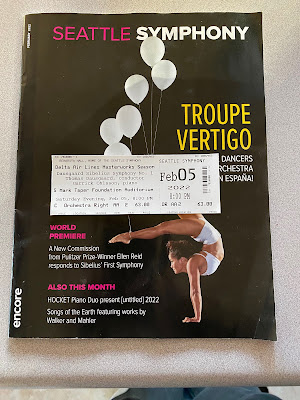After two longs years, we made it back to Benaroya Hall to hear the symphony in all its live, right there, glory. There's something about the experience of live music that transcends all other attempts at its replication.
It just doesn't.
I've been around long enough to have listened to music, of many genres, in any number of delivery systems, from the single ear pieces that came with transistor radios, the kind we'd surreptitiously hide in our pockets—both for the racy music of that time, and because other activities thrust upon us like school and church were boring and having an earpiece, even if it was a cheap one, made us feel like a spy or secret agent—to lots of high-end stereo systems... and everything in between, from boomboxes to Walkmans of every variety (I wore out at least 5 over the years.)
But none of that compares to being right there. Not only hearing the music, but being a part of its creation; its performance. Real people playing real instruments in real time. There's the quiet, the light, the surges, the bombast, the nuance; the great talent and ability to play Rachmaninov, in this instance Garrick Ohlsson, playing the piece from memory. He followed that with an encore, played to perfection, yet with the ease as if he were at the family piano—assuming yours is a concert grand.
The main work was from Sebelius, as well as a new work, commissioned by the Seattle Symphony Orchestra, from Ellen Reid, titled, Today and Today and Today and Today and Today and Today and Today and Today and Today and today; her ode to the joys of pandemic living.
And it was wonderful.
Even the ride down of the lightrail train, brimming with riders and the sounds of life, added to the experience. It was good to be out, masks and all.
©2022 David William Pearce



